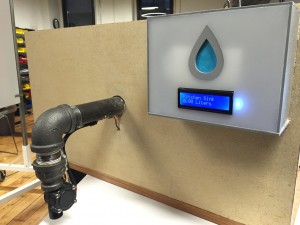Gregoire Housset
Well Tap is a system of networked sensors that allow people to quantify their water consumption on a daily and weekly basis.
http://www.madebygreg.co/well-tap-project-update-12-3/
Description
Well Tap is a network of sensors that attach to a household’s various water outputs (i.e. kitchen faucet, bathroom faucet, shower ect) and gives users a snapshot of their daily and weekly water usage. Each sensor is attached to a console that displays how much water they consume in each use and sends data wirelessly to dweet.io after each use. The Well Tap Dashboard then parses the dweet JSON data to visualize it in Processing.
I created Well Tap because water waste is a big problem but it’s a hard one to wrap your head around for those that don’t live in affected areas. It’s very hard to know what your actual footprint is and that actually creates a lack of accountably to oneself and the greater community. By providing people with clear data on their daily and weekly usage, and comparing that data to average numbers for the various household sizes, users will immediately get some context on their water usage. The goal is not to make anyone feel bad by pointing fingers, but simply to make people more conscious as I believe we are inherently good. I hope something like Well Tap could influence people to make small efforts, and in turn, create systemic change.
Well Tap is the first step in quantifying the intangible aspects of a person’s ecological footprint. Everyone is aware of how much energy they use, because of the important financial implications, however, that doesn’t mean people shouldn’t be conscious of the other aspects just because they’re not as linked to your wallet. In the future, I think there’s great potential in adding a community element to allow users to compare themselves to colleagues and neighbors. Also, I’m really interested in extending this concept to quantifying waste and recycling to bring further transparency to an area where peoples’ understanding seems to be quite opaque.
Classes
Introduction to Computational Media, Introduction to Physical Computing

